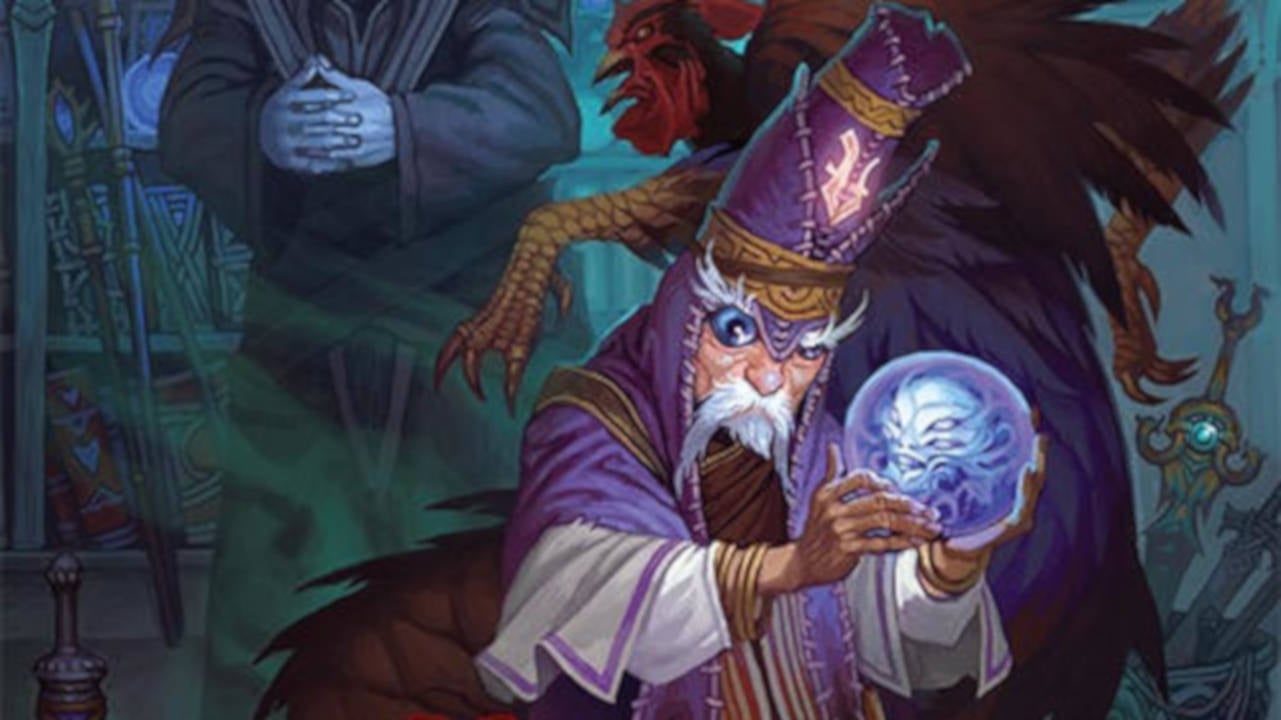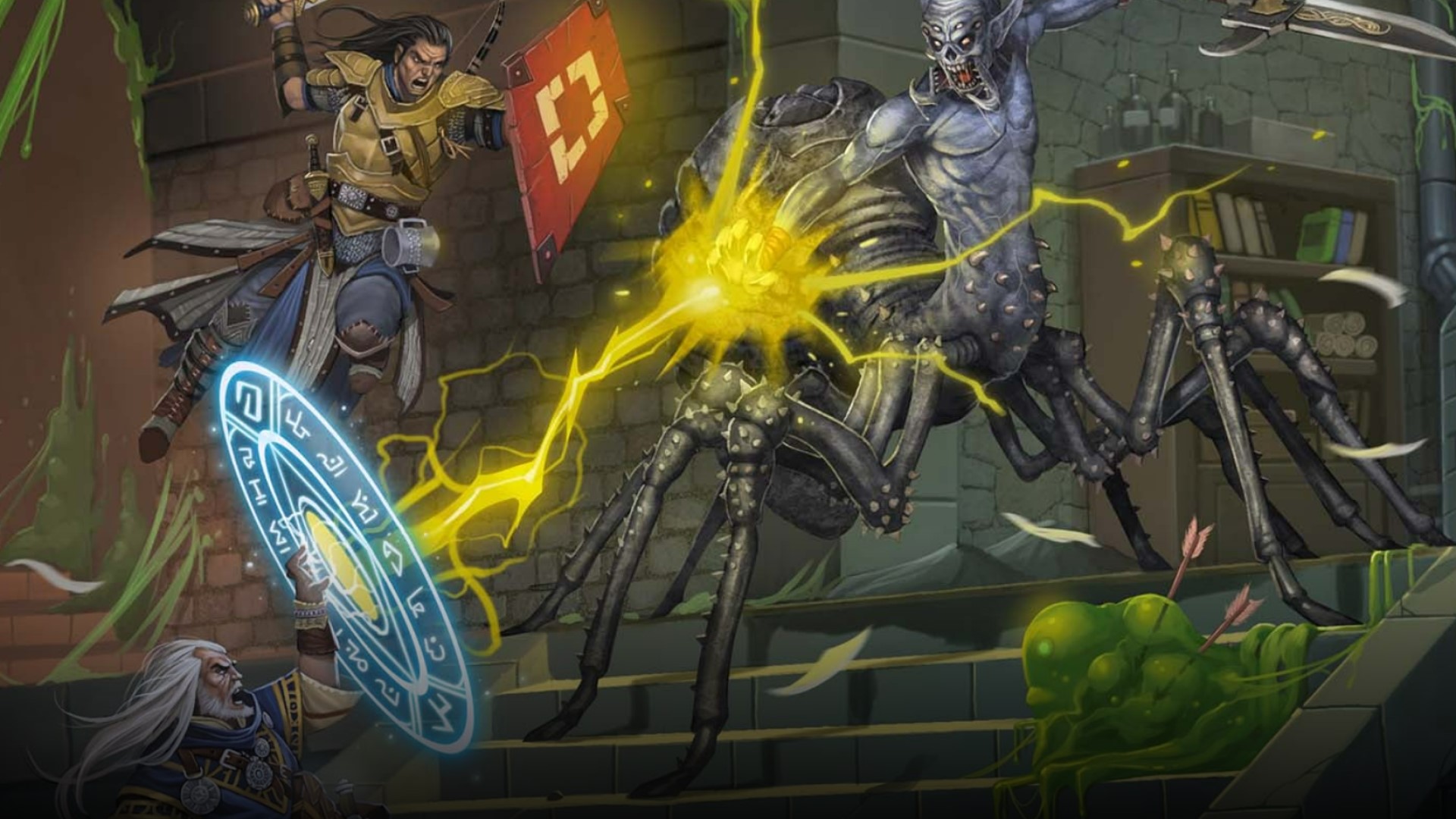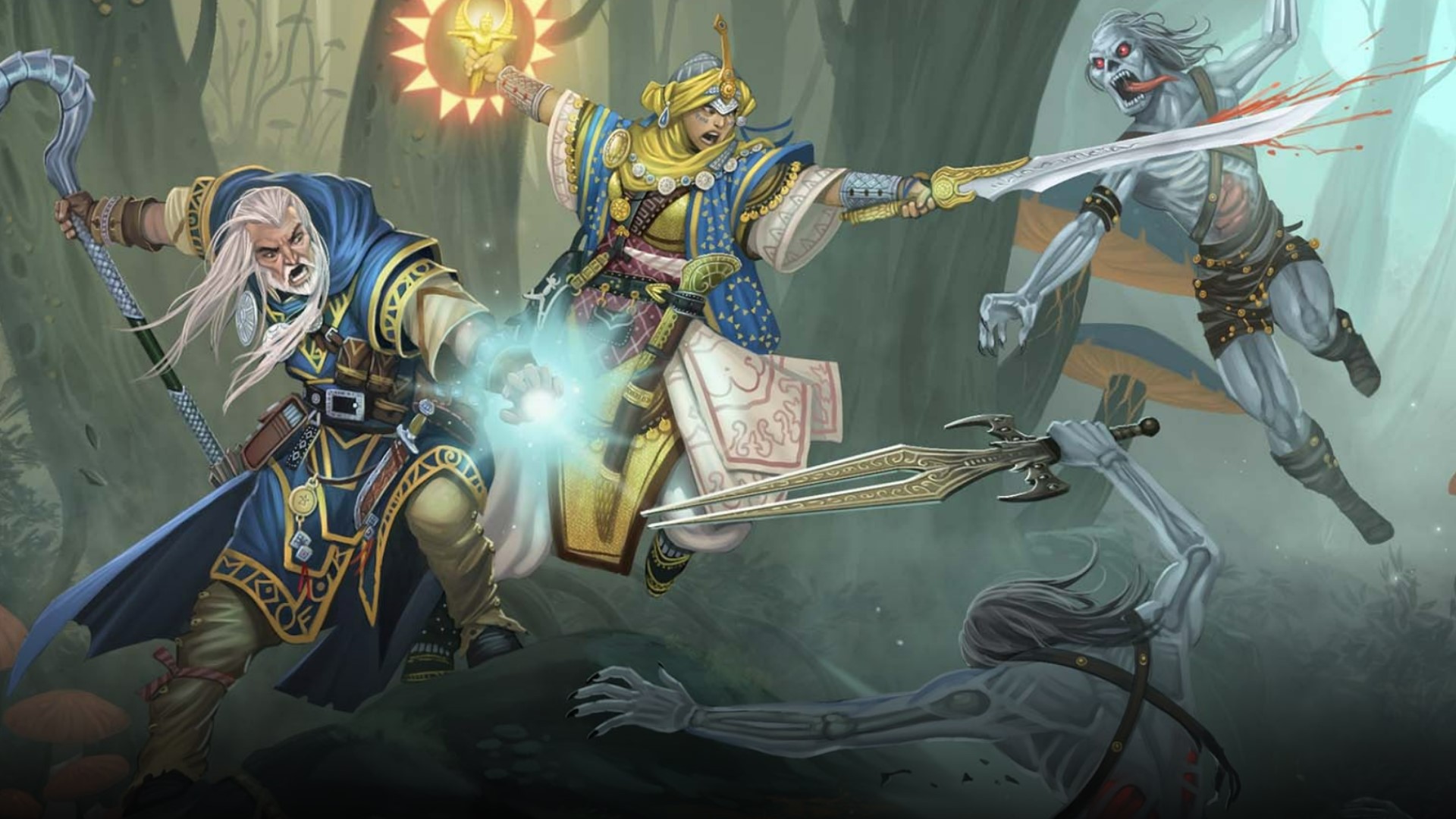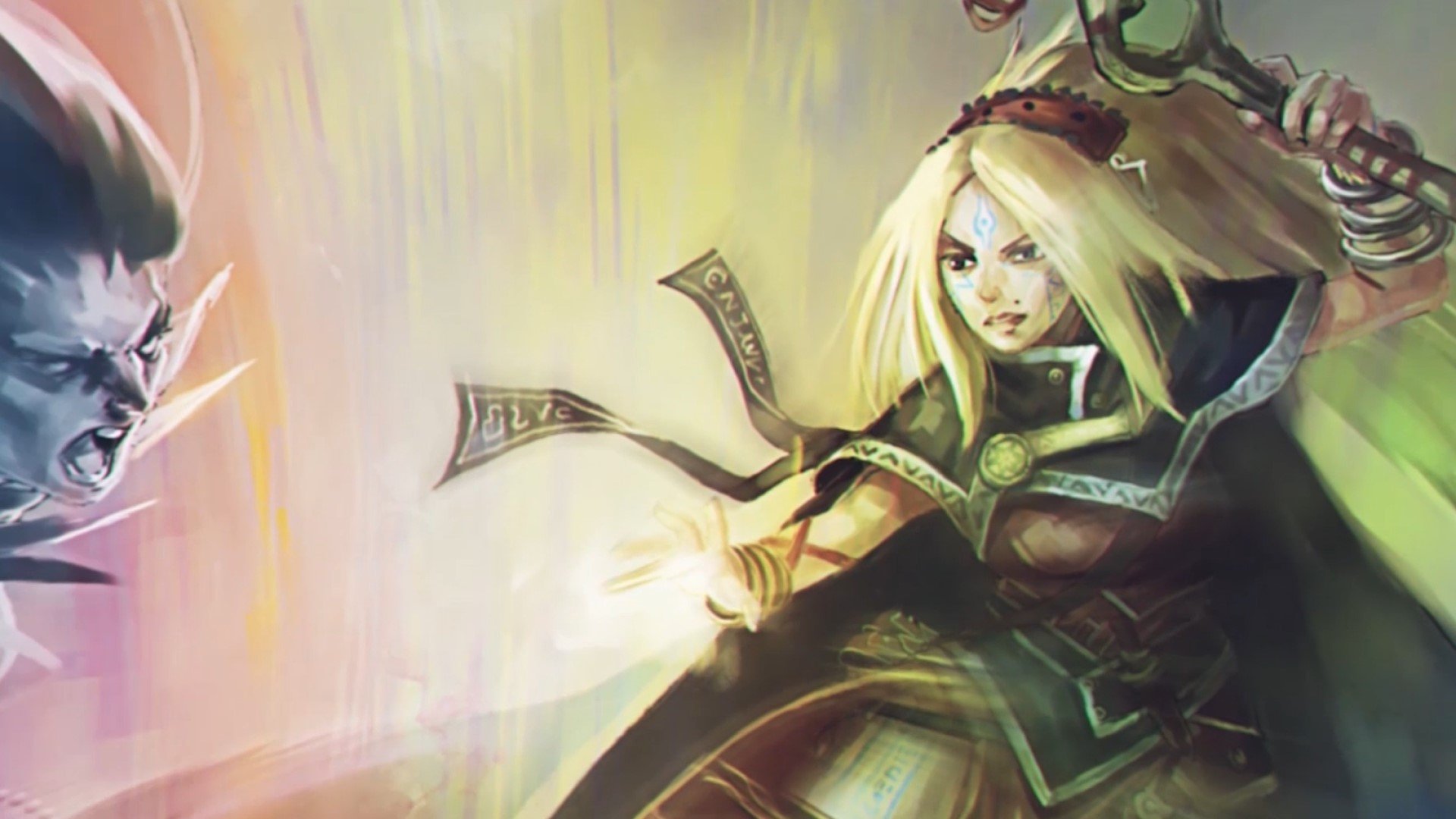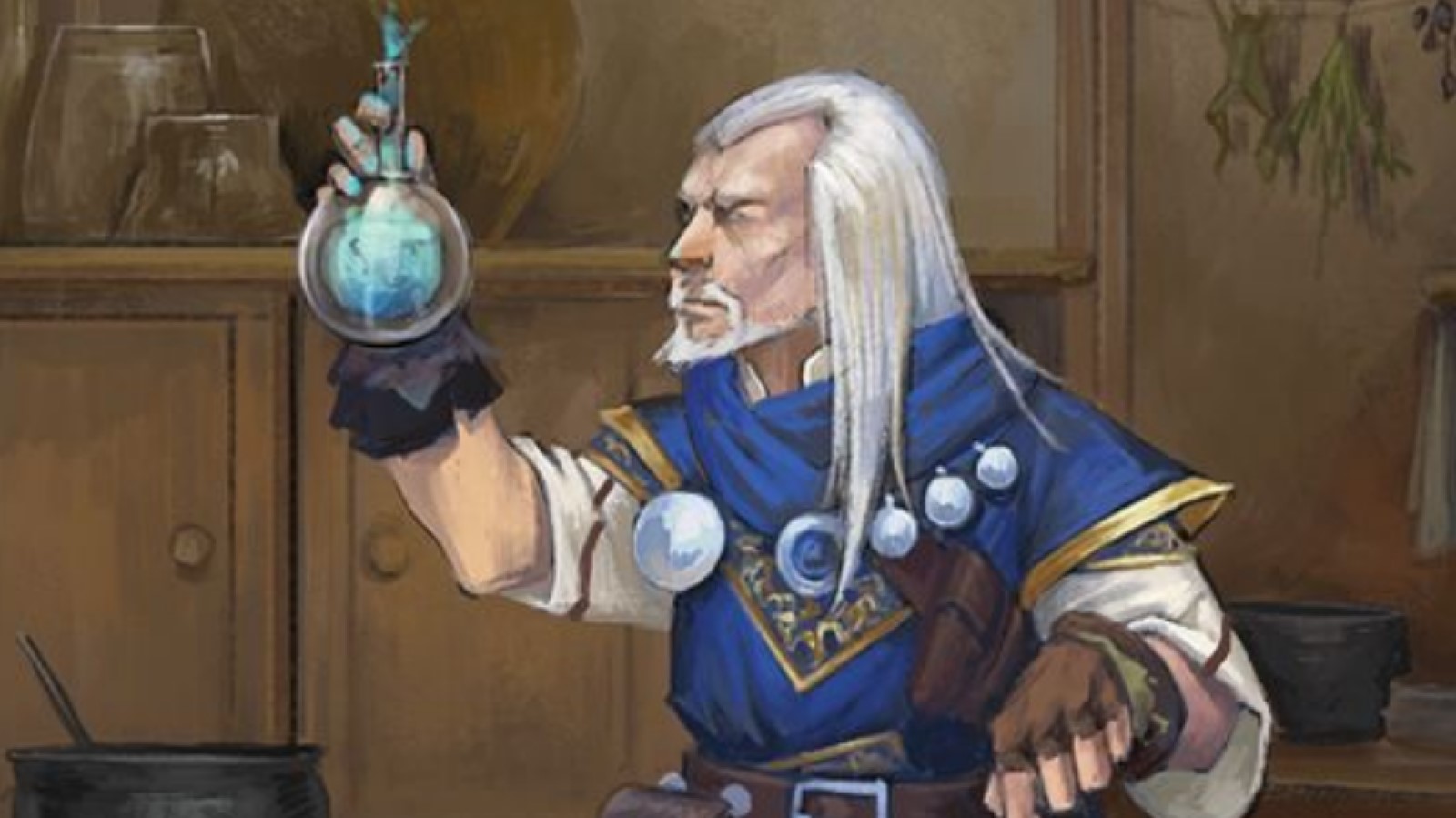To the Pathfinder Wizard, knowledge is everything. It’s the reward they crave and go questing for, whether that’s a quest to the library or across the lands of Golarion. It’s the thing that keeps them alive, allowing them to logic their way out of conflicts or carefully judge what spell will best weaken a foe. Curiosity may not make great armour, but it serves the Wizard 2e in plenty of other ways.
If you’re looking to play one of the spellcasting Pathfinder classes, you can’t go wrong with a 2e Wizard. Grab your Pathfinder character sheets, choose one of the Pathfinder races, and get ready to leap down the Wizard rabbit hole, head and pointy hat first.
Here’s your guide to the Pathfinder 2e Wizard class:
- Pathfinder Wizards stats and proficiencies
- Pathfinder Wizard class features
- Pathfinder Wizard spells
- Pathfinder Arcane Schools
- Pathfinder Wizard feats
Pathfinder Wizards stats and proficiencies
Your key ability is Intelligence, and you get an ability boost to this stat at first level. Your starting hit points are your Constitution modifier plus six, and you’ll add this same number to your HP maximum every time you level up.
These are the level one Wizard proficiencies:
| Type | Name | Rank |
| Skill | Perception | Trained |
| Skill | Arcana | Trained |
| Saving throw | Fortitude | Trained |
| Saving throw | Reflex | Trained |
| Saving throw | Will | Expert |
| Attack | Club | Trained |
| Attack | Crossbow | Trained |
| Attack | Dagger | Trained |
| Attack | Heavy crossbow | Trained |
| Attack | Staff | Trained |
| Attack | Unarmed attacks | Trained |
| Defences | Armour | Untrained |
| Defences | Unarmoured defence | Trained |
| Spells | Arcane spell attacks | Trained |
| Spells | Arcane spell difficulty checks | Trained |
Wizards are also trained in additional skills equal to their Intelligence modifier plus two.
Pathfinder Wizard class features
Here are the Wizard-specific class features you’ll access as your character levels up:
| Level | Features |
| 1 | Arcane Spellcasting, Arcane School, Arcane Bond, Arcane Thesis |
| 2 | Wizard feat |
| 3 | Second-level spells |
| 4 | Wizard feat |
| 5 | Third-level spells, Lightning Reflexes |
| 6 | Wizard feat |
| 7 | Fourth-level spells, Expert Spellcaster |
| 8 | Wizard feat |
| 9 | Fifth-level spells, Magical Fortitude |
| 10 | Wizard feat |
| 11 | Sixth-level spells, Alertness, Wizard Weapon Expertise |
| 12 | Wizard feat |
| 13 | Seventh-level spells, Defensive Robes, Weapon Specialisation |
| 14 | Wizard feat |
| 15 | Eighth-level spells, Master Spellcaster |
| 16 | Wizard feat |
| 17 | Ninth-level spells, Resolve |
| 18 | Wizard feat |
| 19 | Archwizard’s Spellcraft, Legendary Spellcaster |
| 20 | Wizard feat |
There are some generic level-up features that every Pathfinder character gets, so be sure to keep an eye on the Pathfinder 2e Core Rulebook as your character progresses. For now, let’s look at what the Wizard class features mean.
Arcane Spellcasting
Level: One
This refers to your ability to cast Wizard spells. Rules-wise, it means you can use the Cast a Spell activity, and Intelligence is your spellcasting modifier. You can prepare a certain number of spells and cantrips per day. We’ll look at spells in a bit more detail shortly.
Arcane School
Level: One
Wizards can choose to specialise in a particular arcane school (more on each of these later). You don’t have to stick to one school, but you do get extra spells and spell slots specific to your chosen school for each spell level you have slots for. Plus you can prepare an extra cantrip from that school and add an extra spell to your spellbook.
On the other hand, you could choose to be a universalist Wizard with fingers in many magical pies. This instead gives you a once-per-day use of Drain Bonded Item (see Arcane Bond below) equal to the level of Wizard spell slots you have. You’ll also get an extra Wizard feat, and you can add another first-level spell of any school to your spellbook.
Arcane Bond
Level: One
You form a powerful, magical bond with a specific item every time you prepare your spells. This gives you the Drain Bonded Item free action, which lets you cast a spell you’d prepared and already cast without using a fresh spell slot.
Arcane Thesis
Level: One
In a move that makes them relatable to stressed uni students everywhere, Wizards each produce a thesis on their chosen (magical) research topic. You can come up with whatever wordy, academic title you want for the thesis, but mechanically it’ll likely do one of the following:
- Gives you the Familiar feat, and your familiar gains an extra ability at first, sixth, 12th, and 18th level; also gives you the Drain Familiar free action instead of Drain Bonded Item
- Gives you a first-level metamagic feat at first level, plus an extra feat at fourth level you can swap out when preparing spells
- Lets you trade two spell slots for a bonus spell slot a max of two levels higher or lets you trade one spell slot for two extra cantrips
- Lets you dump a prepared spell and prepare a different one from your spellbook; this takes ten minutes, and the original spell remains if you’re interrupted
Lightning Reflexes
Level: Five
Think fast! This feature changes your proficiency rank for Reflex saving throws to expert.
Expert Spellcaster
Level: Seven
As your powers develop, you’ll find the arcane world a little easier to master. This means your proficiency rank for arcane spell attack rolls and spell difficulty checks is changed to expert.
Magical Fortitude
Level: Nine
This feature changes your proficiency rank for Fortitude saving throws to expert.
Alertness
Level: 11
Your ability to keep those peepers peeled gets even better, as your Perception proficiency rank increases to expert level.
Wizard Weapon Expertise
Level: 11
You’ve had plenty of skill and saving throw proficiency boosts so far; now let’s take a look at your weapons arsenal. This feature gives you expert proficiency with all the main wizard weapons. Namely, this includes clubs, crossbows, heavy crossbows, daggers, staffs, and unarmed attacks.
Defensive Robes
Level: 13
Your unarmoured defence is now at expert level. Something about those wizard robes is great at keeping you out of trouble, even if you don’t don chainmail.
Weapon Specialisation
Level: 13
By now, you’re an expert in plenty of weapons. Weapon specialisation lets you deal two extra damage with attacks at the expert proficiency rank. Even better, you can deal three extra damage at master rank and four at legendary level.
Master Spellcaster
Level: 15
You’re getting pretty good at this magic thing by level 15, so your proficiency rank for arcane spell attack rolls and spell difficulty checks have reached master level.
Resolve
Level: 17
The ‘resolve’ referred to here is all in the mind. Your Will proficiency is now at master rank, and you get a critical success every time you succeed on a Will saving throw.
Archwizard’s Spellcraft
Level: 19
Archwizard’s Spellcraft grants you a tenth-level spell slot. You can only get one of these (unless you take a specific feat), so use it wisely. Because of its power, there are also a few extra rules you should take note of: you can’t use the spell slot on spells that are cast without using up a spell slot or give you more spell slots.
Legendary Spellcaster
Level: 19
Finally, you’re a legend in the Wizarding world; a caster of true renown. Arcane spell attacks and spell difficulty checks are now at legendary proficiency rank.
Pathfinder Wizard spells
Here’s what a Wizard’s spell slots per day look like:
| Wizard level | Cantrips | 1st-level spells | 2nd-level spells | 3rd-level spells | 4th-level spells | 5th-level spells |
| 1 | 5 | 2 | – | – | – | – |
| 2 | 5 | 3 | – | – | – | – |
| 3 | 5 | 3 | 2 | – | – | – |
| 4 | 5 | 3 | 3 | – | – | – |
| 5 | 5 | 3 | 3 | 2 | – | – |
| 6 | 5 | 3 | 3 | 3 | – | – |
| 7 | 5 | 3 | 3 | 3 | 2 | – |
| 8 | 5 | 3 | 3 | 3 | 3 | – |
| 9 | 5 | 3 | 3 | 3 | 3 | 2 |
| 10 | 5 | 3 | 3 | 3 | 3 | 3 |
| 11 | 5 | 3 | 3 | 3 | 3 | 3 |
| 12 | 5 | 3 | 3 | 3 | 3 | 3 |
| 13 | 5 | 3 | 3 | 3 | 3 | 3 |
| 14 | 5 | 3 | 3 | 3 | 3 | 3 |
| 15 | 5 | 3 | 3 | 3 | 3 | 3 |
| 16 | 5 | 3 | 3 | 3 | 3 | 3 |
| 17 | 5 | 3 | 3 | 3 | 3 | 3 |
| 18 | 5 | 3 | 3 | 3 | 3 | 3 |
| 19 | 5 | 3 | 3 | 3 | 3 | 3 |
| 20 | 5 | 3 | 3 | 3 | 3 | 3 |
| Wizard level | 6th-level spells | 7th-level spells | 8th-level spells | 9th-level spells | 10th-level spells |
| 1 | – | – | – | – | – |
| 2 | – | – | – | – | – |
| 3 | – | – | – | – | – |
| 4 | – | – | – | – | – |
| 5 | – | – | – | – | – |
| 6 | – | – | – | – | – |
| 7 | – | – | – | – | – |
| 8 | – | – | – | – | – |
| 9 | – | – | – | – | – |
| 10 | – | – | – | – | – |
| 11 | 2 | – | – | – | – |
| 12 | 3 | – | – | – | – |
| 13 | 3 | 2 | – | – | – |
| 14 | 3 | 3 | – | – | – |
| 15 | 3 | 3 | 2 | – | – |
| 16 | 3 | 3 | 3 | – | – |
| 17 | 3 | 3 | 3 | 2 | – |
| 18 | 3 | 3 | 3 | 3 | – |
| 19 | 3 | 3 | 3 | 3 | 1* |
| 20 | 3 | 3 | 3 | 3 | 1* |
*See Archwizard’s Spellcraft feature.
Pathfinder Arcane Schools
Some Wizards choose to be universalists, dipping their Wizard-y toes into multiple arcane schools. However, if you want to specialise (and gain access to the tasty school-specific extras), here’s a rundown on what kind of magic each school has to offer.
Abjuration
Abjuration magic is all about defence, protection, and preventing harm before it can be caused. It’s a top choice if you’re playing a particularly peaceful character or you want to play more of a supporting role in combat.
Conjuration
Conjuration is all about pulling things from thin air. This school’s spells let you summon creatures, create useful resources, or transport objects (and creatures!) to different places. If you want to go to war like Snow White and her forest friends in that one part of Shrek 3, Conjuration can make that happen.
Divination
Solving mysteries and finding out the latest gossip is a lot easier with Divination magic, as this school is all about magical methods of uncovering information. Whether you want to speak with plants and animals to gather your intel or mentally dissect another person, you can divine your way to the answers you’re after.
Enchantment
Enchantment uses magic to influence the state of creatures around you. This school of Wizards know that real power lies in the mind – and that control over another’s mind can reap many rewards. Control minds, bolster minds, confuse minds, or even melt minds. It’s all possible here.
Evocation
Evocation magic focuses on harnessing the raw power of the elements. This can have plenty of supportive effects, but it also creates a lot of destruction. In the school of Evocation, the power of flames, lightning, water, and more are at your fingertips.
Illusion
Illusion magic does what it says on the tin; it creates images and sensations that aren’t really there. Whether you want to delight allies with parlour tricks or throw an enemy off guard before the Barbarian socks them in the face, this’ll be the school to sign up to. Tricksy and cunning Wizards are welcome here.
Necromancy
Only the school of necromancy gives you total power over life and death. Sure, healing spells may be dime-a-dozen these days, but you know what isn’t? Zombies. Necromancy Wizards often lose friends for their choice of magical study, but they also gain friends too (the friends are zombies).
Transmutation
We see people turn one thing into something else all the time in life. Heat turns bread into toast, and time turns eggs into chickens; but Transmutation Wizards are the ones really doing transformations in style. Here you can warp the world around you to your whim. Fly, turn stone to flesh, or even shape time itself. The possibilities are endless.
Pathfinder Wizard feats
Wizards regularly learn new feats as they level up, giving them access to all-new abilities. Below you’ll find the different Wizard feat options:
| Level | Feats available |
| 1 | Counterspell, Eschew Materials, Familiar, Hand of the Apprentice, Reach Spell, Widen Spell |
| 2 | Cantrip Expansion, Conceal Spell, Enhanced Familiar |
| 4 | Bespell Weapon, Linked Focus, Silent Spell |
| 6 | Spell Penetration, Steady Spellcasting |
| 8 | Advanced School Spell, Bond Conservation, Universal Versatility |
| 10 | Overwhelming Energy, Quickened Casting, Scroll Savant |
| 12 | Clever Counterspell, Magic Sense |
| 14 | Bonded Focus, Reflect Spell, Superior Bond |
| 16 | Effortless Concentration, Spell Tinker |
| 18 | Infinite Possibilities, Reprepare Spell |
| 20 | Archwizard’s Might, Metamagic Mastery, Spell Combination |

